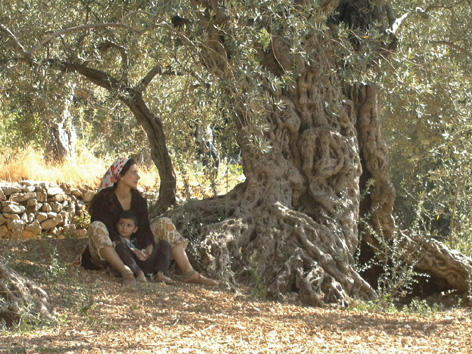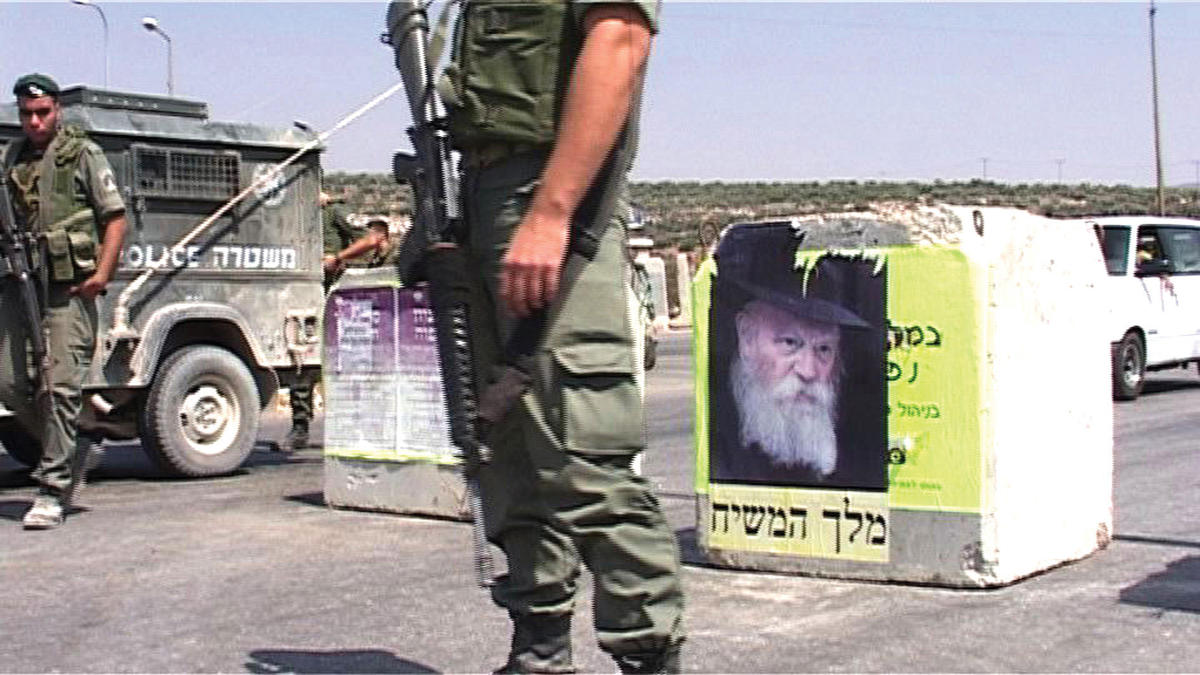
“The Arabs are coming!” wrote critics — some not even Middle Eastern — from Cannes in 2002, intoxicated by the rash of good films from the region and the success of Elia Suleiman’s Divine Intervention. In 2003, the enthusiasm was muted, although Moroccan first-timer Faouzi Bensaidi’s One Thousand Months gave even the cynics something to celebrate. But at Cannes Film Festival 2004, alas, even the most enthused critics had to admit that it was now the Asians, rather than the Middle Easterners, who were having their day. Iran, the darling of the arthouse circuit, only had a couple of films competing — although they did include Mohsen Amiryoussefi’s fantastically quirky Khab E Talkh (Bitter Dream). (Out of competition, Kiarostami’s Five left gallery directors salivating, but most film critics slightly bewildered, a fact not aided by the straight-talking veteran auteur’s repeated assertions that his film was “about nothing” and in no way an art installation.)
Thirty-two-year-old Mohsen Amiryoussefi’s first feature is a black comedy set in a cemetery in Sedeh, near Esfahan. Starring its real-life employees, the picture tells the tale of Esfandiar, a cantankerous body-washer who comes face to face with Ezrael (the Angel of Death). With his life flashing before his eyes — often, surreally, through his beloved black-and-white television — Esfandiar is forced to reconsider his behavior. Wonderfully underplayed, with a good dose of gallows humor, Bitter Dream was awarded a Camera d’Or Special Mention.
The Middle East in general was of course high on the agenda, with Michael Moore’s Palme d’Or-winner Fahrenheit 9/11 dominating the headlines (and since going on to dominate the box office, even in Middle Eastern, documentary-phobic cinemas). Tony Gatlif’s ‘exotic’ travelogue Exiles inexplicably took home Best Director.
Arab films from the Arab world, however, were largely disappointing, leaving their directors empty-handed and the critics underwhelmed. Master-filmmakers Youssef Chahine (Alexandria–New York) and Yousry Nasrallah (the four-and-a-half hour Bab Al Chams) did have turns in the spotlight, but left even their most ardent fans wanting. The Euro crowd was more impressed by Mohammed Asli’s moving Italian-Moroccan co-production, In Casablanca the Angels Don’t Fly. Beautifully shot, the film follows the efforts of Said, a Berber villager, to juggle family life back home with his job in a city restaurant. Although In Casablanca suffered the odd slip into melodrama, and there were some sentimental Italian fingerprints on the lens, the film benefited from a stellar cast, some excellent storylines, and moments of idiosyncratic brilliance. Asli is one to watch.
Among some slow-burners, including Afghan Atiq Rahimi’s stunning Khâkestar-o-khâk (Earth and Ashes), it was Danielle Arbid’s well-styled Maarek Hob (In the Battlefields) that won the plaudits. Set in East Beirut during the Lebanese civil war, the film focuses on a Christian family attempting to survive the war outside and, most devastatingly, what Arbid has called the “internal war” within. Centering on twelve-year-old Lina and her friendship with her free-spirited aunt’s maid, Siham, the film is a moving, melancholic depiction of a girl prematurely brought to the edge of adulthood and the cruelties that exist within us all.
A little over a month later, the Cannes gang had their second French outing in Paris, at the Biennale des Cinémas Arabes, traditionally the world’s most comprehensive venue for Arab filmmaking. Festival director Magda Wassef and her team at the Institut du Monde Arabe played host to an eclectic range of films and documentaries. In the competitive feature film section, strong contenders Tawfik Abu-Wael’s Atash and Mohammed Asli’s In Casablanca were joined by Tunisian director’s Nawfel Saheb-Ettaba’s romantic drama El Kotbia and Hani Khalifa’s popular hit Sahar al-Layali (Sleepless Nights), among others. Drawing particular acclaim, and subsequently walking away with the Grand Jury Prize, was Danielle Arbid’s In the Battlefields.
Elsewhere the documentaries on offer varied wildly in quality. Sherine Salama’s warm, gripping A Marriage in Ramallah delighted viewers, but Nigol Bezjian’s Muron, depicting a Lebanese-Armenian priest’s painstaking attempts to cook the holy oil of communion, was ruined by over-direction and poor editing. Indeed, plagued by indulgent edits, many directors — especially exiles returning home — could take a leaf out of Jihane Al-Tahri’s book. The documentary director has produced a tight, TV-style tale in The House of Saud. Through an impressive selection of ‘talking heads,’ plus archival footage, she details the rise and subsequent decline in fortunes of Saudi Arabia’s ruling family from the days of founding father King Abdul Aziz through to the kingdom’s post-9/11 troubles.
Among the shorter documentaries, it was Myrna Maakaron’s deceptively simple BerlinBeirut and Hichem Ben Ammar’s portrait of Tunisian fishermen, Rais Lebhar! O Capitaine des Mers, which stood out. The latter consequently won the top prize in its category, deserving the award alone for a scene in which the men take to the sea and descend upon a huge catch of tuna, the blue waters turning white and red with blood and the deafening sounds of the dying fish juxtaposed with the jubilant cries of the fishermen. Ammar al-Beik deserves a mention for his highly original Le Clap, an attempt to unravel the mysterious goings-on in a monastery in the Syrian mountains.
But with the cinemas never more than two-thirds full, and a mixed bag of films, directors and journalists spent their coffee breaks debating whether there was a crisis in Arab cinema. Bidoun put the question to eminent festival director Magda Wassef: “There’s no such thing as ‘an Arab cinema’ as such, but many Arab cinemas, and new talent is emerging all the time. We have Danielle Arbid, who lives in France, making a very Lebanese film; for the first time, we have short films from Saudi Arabia and the UAE, and a retrospective of films from Iraq, and a multitude of films about the Palestinian experience. Over the years the quality of the audience has changed — they stay now, and discuss the films, they’re more engaged.”
From Paris, the itinerant gang of Arab cinephiles decamped to Palestine, for the opening, on July 8, of the first Ramallah International Film Festival in the city’s new Cultural Palace. Festival director Adam Zuabi, twenty-nine, has lived in Jerusalem, Los Angeles and, for the last five years, primarily in Rome. Working together with Ramallah-based Fatin Farhad and a young crew of volunteers, he was justifiably proud to have pulled off an ambitious program of more than eighty films from twelve countries, three different screening locations, an educational program and forty guests from around the world. The RIFF also included a Palestinian Silver Screen competition focusing especially on first films by young Palestinian filmmakers; the very first National Screenplay Competition for high schools; and a range of workshops with film experts from around the world.
But the obvious enthusiasm behind the project was not in itself enough to guarantee that everything ran flawlessly. Apart from those technical glitches so much a part of any festival, there were other problems that cast longer shadows, including the festival’s opening and closing films crackling to a halt while in full flight (Walter Salles’s Motorcycle Diaries and Tawfik Abu-Wael’s Atash, respectively). Unfortunately, the Palestinian Silver Screen winner and new hope of local film — Raed al-Helou’s La’alo Kheir (Hopefully for the Best) — went on to experience the same fate. (That the projector bought especially for the festival had been impounded by the Israelis, and then replaced with a make-do version, was illustrative of the kind of battles the festival faced.)
The RIFF organizers did a sterling job — especially considering that the crew only convened two weeks before the festival, many of them with no previous experience of event management, and all working unpaid. Maybe that’s why the festival office atmosphere resembled a university campus gathering — except that everyone looked on the verge of collapse. How far the city’s reluctance to get involved was due to political infighting, the management’s faulty communication, or wrangling between local interest groups is impossible to tell. In future, though, it will be vital to forge a closer bond between the RIFF and the city itself. Nonetheless, that so few Palestinians from Jerusalem or Bethlehem — let alone Nablus or Hebron — made it to the festival, had less to do with the festival organization and much more to do with the political situation. (With the Kalandia and Ram checkpoints closed from 9 pm on, it was simply impossible to get out of Ramallah in the evening). And despite all this, the Palestinian film screenings in particular were very popular, with demand exceeding the available space in the relatively small garden at the Sakakini Center.
The day after the RIFF ended, when Ramallah was just beginning to recover from all the excitement, a key event took place. Relatively spontaneously and thanks to a supremely unconventional talent for organization on the part of the filmmakers Elias Suleiman and Simone Bitton, Bitton’s latest documentary film Wall was screened in Abu Dis, with the film actually projected on to the wall itself. “I could hardly imagine anywhere better to show it,” a visibly moved Bitton commented shortly before the screening. The audience of around 300 was seated on plastic chairs, quickly set up before the evening call to prayer; when the film started, the soundtrack echoed far along the wall itself. Both the film and its setting were inspired; the audience found themselves a part of the story being projected onto it. A grotesque reflection, rife with consequences.
All in all, the RIFF was a great achievement — not least for local filmmakers, many of whom had their films picked up by various festivals and European broadcasters for screening over the next months. As an exhausted Adam Zuabi put it at the end: “The festival got lots of coverage, both negative and positive. We had up to 1200 visitors a day, which is more than we’d hoped for given the circumstances. As I see it, we’ve made a start. People here have now been woken up to film as a medium, and it’s made its entrance into Ramallah — what more do we want?” Zuabi perhaps answered his question by assuring Bidoun that the RIFF will be an annual event — which fits in nicely with the spirit of Festival winner La’alo Kheir, or Hopefully for the Best.
www.festival-cannes.fr
www.biennalecinemarabe.com
www.ramallahfilmfestival.org
